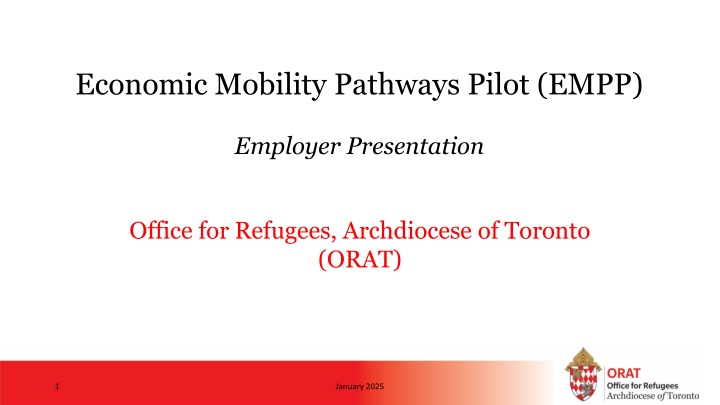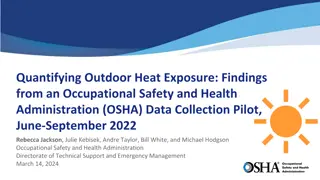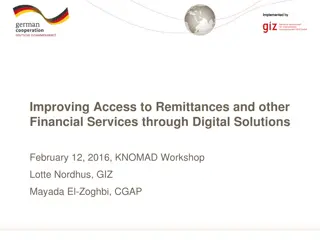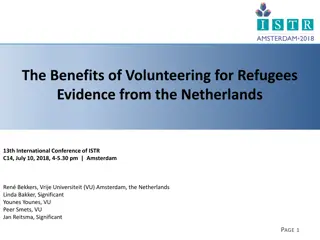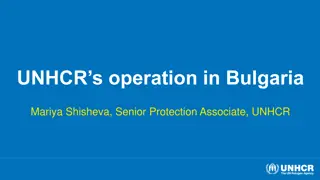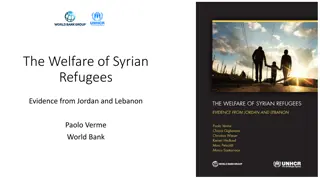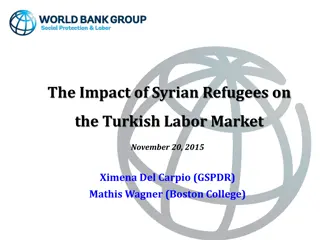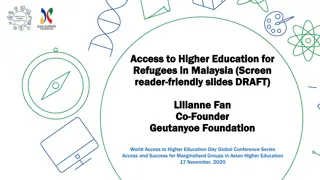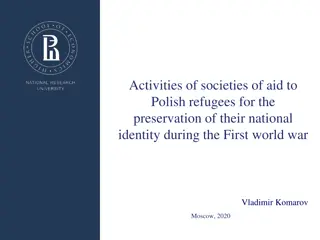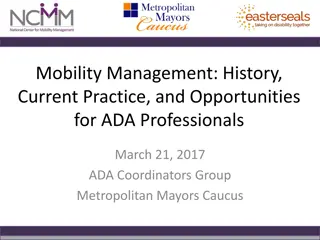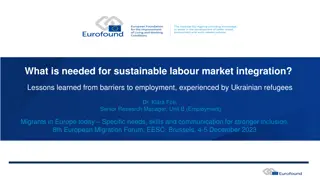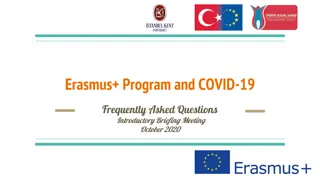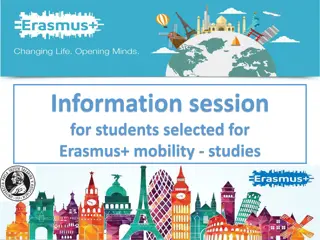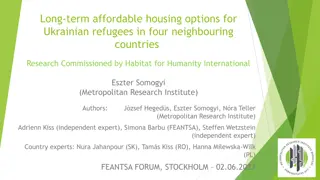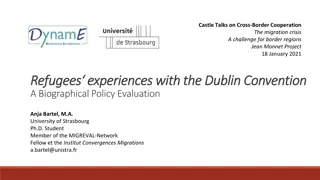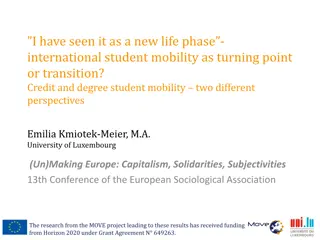Economic Mobility Pathways Pilot: Employer Presentation for Refugees
This presentation introduces the Economic Mobility Pathways Pilot (EMPP) by the Office for Refugees, Archdiocese of Toronto (ORAT), focusing on connecting Canadian employers with skilled refugee candidates. It covers important considerations, employer responsibilities, ORAT's role as a trusted partner, and the EMPP process steps.
Download Presentation

Please find below an Image/Link to download the presentation.
The content on the website is provided AS IS for your information and personal use only. It may not be sold, licensed, or shared on other websites without obtaining consent from the author.If you encounter any issues during the download, it is possible that the publisher has removed the file from their server.
You are allowed to download the files provided on this website for personal or commercial use, subject to the condition that they are used lawfully. All files are the property of their respective owners.
The content on the website is provided AS IS for your information and personal use only. It may not be sold, licensed, or shared on other websites without obtaining consent from the author.
E N D
Presentation Transcript
Economic Mobility Pathways Pilot (EMPP) Employer Presentation Office for Refugees, Archdiocese of Toronto (ORAT) 1 January 2025
Meeting Agenda About EMPP Important Considerations for Employers Employer Responsibilities ORAT Responsibilities as a Trusted Partner The EMPP Process Discussion 2
About EMPP The Economic Mobility Pathways Pilot (EMPP) looks to meet the skilled labour needs of Canadian employers by giving them access a new pool of qualified candidates, skilled refugees from abroad. EMPP relies on Trusted Partners to connect employers with eligible refugees. 3
Important Considerations for Employers Provides Access to a New Pool of Skilled Candidates Resumes (or Curriculum Vitae) of eligible skilled refugees are provided to employers. Expedited Processing Immigration Canada has committed to processing cases within 6-12 months. Participation Fee: The program is funded through a participation fee paid by employers Funds are used to offset administrative expenses, PR application fee, referral costs, etc Arms-length relationship between employer and selected candidate. 4
Employer Responsibilities Register with ORAT & Identify Employment Needs Job Description based on National Occupation Classification (NOC) - ORAT can assist with NOC Candidate Selection (Virtual Interview) Offer of Employment: 1 Year Contract, 30hr/week or 1,560hrs Arrival Assistance Participation Fee Compliance with Employment Law (e.g., termination) 5
ORATs Responsibilities as a Trusted Partner Understand labour needs of employer Screen & Select Eligible Candidates, providing CVs to employers: Refugee & Durable Solution In-Demand Skill(s) English Language Assessment Completion / Submission of Immigration Canada Forms Newcomer Orientation Arrival/Settlement Assistance 6
Process Steps ORAT Identifies Qualified Candidates Employer - Candidate Selection ORAT Submits Application to IRCC Identify Employer Needs Medicals & Travel Arrangements IRCC s Review Arrival & Settlement (6-9 months) (3 months) 7
Discussion Q1: Will this program be beneficial to your organization? Q2: If so, what skills is your organization in need of? Q3: How many individuals do you need for each skill category? Next steps 8
Appendix: About ORAT The Office of Refugees (ORAT) is a department of the Roman Catholic Archdiocese of Toronto. ORAT administers the Archdiocese s Sponsorship Agreement by partnering with church communities who have been affected by the global refugee crisis to sponsor parishioner families to Canada. We offer a program for those outside the church as well. ORAT plans to work through these church communities to identify qualified refugees for this program. 9
FAQs: Refugee Status: Sponsored refugee & family arrive to Canada as Permanent Residents (PRs). Employer Settlement Responsibilities: Include airport pick-up and arrangement of temporary accommodations. Contractual Obligations: Employers to follow employment law, including laws related to notice periods. National Occupation Classification (NOC): NOC is used to identify the education, work experience and English language competency that is required by the refugees. 10
NOC Teers TEER Occupation types Examples TEER 0 Management occupations Advertising, marketing and public relations managers Financial managers TEER 1 Occupations that usually require a university degree Financial advisors Software engineers TEER 2 Occupations that usually require a college diploma apprenticeship training of 2 or more years, or supervisory occupations Computer network and web technicians Medical laboratory technologists TEER3 Occupations that usually require a college diploma apprenticeship training of less than 2 years, or more than 6 months of on-the-job training Bakers Dental assistants and dental laboratory assistants TEER 4 Occupations that usually require a high school diploma, or several weeks of on-the-job training Home child care providers. Home support workers, caregivers and related occupations. Tailors, dressmakers, Retail salespersons and visual merchandisers. Security guards & related security service occupations TEER 5 Occupations that usually need short-term work demonstration and no formal education Landscaping and grounds maintenance labourers. Light & heavy-duty cleaners. General labourers across a number of industries Delivery service drivers and door-to-door distributors Store shelf stockers, clerks and order fillers. Food counter attendants, kitchen helpers, servers Construction trades helpers and labourers. Other trades helpers and labourers 11
The EMPP has Two Streams 1. The Regional EMPP 1. Through one of 3 selected economic programs. The regional EMPP. 1. Atlantic Immigration Program 2. Provincial Nominee Program 3. Rural and Northern Immigration Program (RNIP) 2. To be eligible for one of the above programs, you apply first to a province, territory or RNIP community (depending on which program you choose.) 2. The Federal EMPP: The federal EMPP includes a Job Offer and No Job Offer stream. 1. Apply Directly to IRCC for the EMPP. 2. You need to meet the work experience, education, and language requirements. 3. Job Offer Stream Requirements You must have a job offer that is; full time (at least 30 hours/week) and non-seasonal from a Canadian employer for a job listed in TEER Categories 0, 1, 2, 3, 4 or 5 of the National Occupation Classification 12
